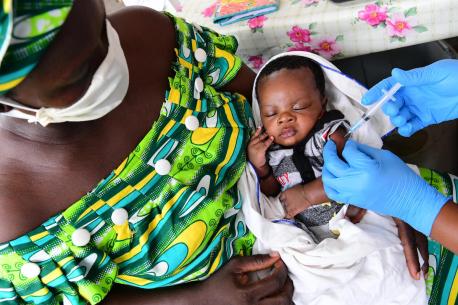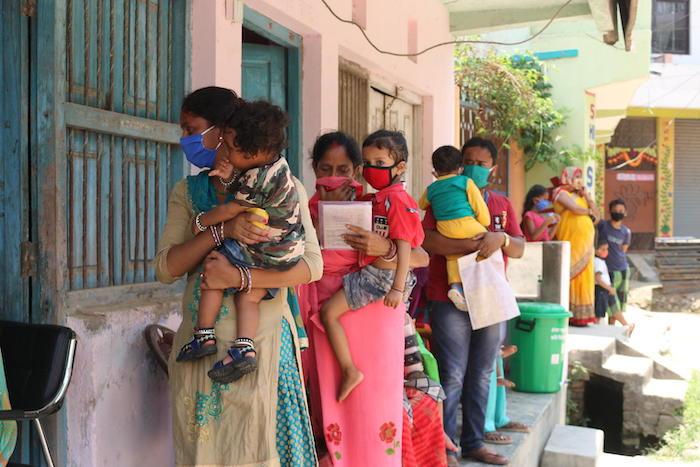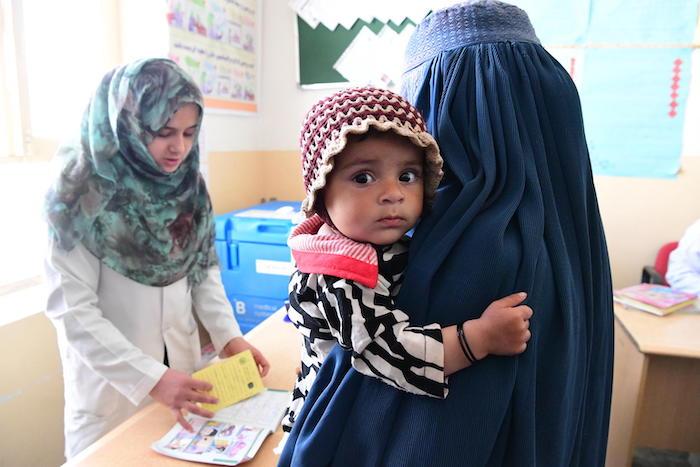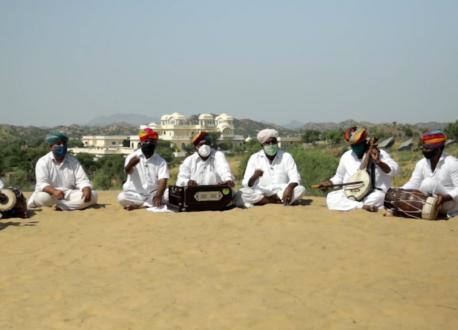
Spike in Measles Deaths Predates Pandemic
Even before COVID-19 disrupted routine immunization for millions of kids around the world, measles was making a comeback — claiming 207,500 lives in 2019, a 50 percent jump in three years. With the release of the latest data, UNICEF and partners renew urgent calls for collective action to ensure every child is protected.
The measles vaccine — introduced nearly 60 years ago — has saved tens of millions of lives.
Yet a true global victory against measles — seemingly within reach for so long — remains elusive due to gaps in vaccination coverage. Children get missed, for any number of reasons. And for as long as there are gaps, there will be outbreaks — and deaths.
Measles cases surged worldwide in 2019 to 869,770, according to new data released Nov. 12 by the World Health Organization (WHO) and the U.S. Centers for Disease Control and Prevention (CDC) — the highest number of cases reported since 1996. Measles deaths climbed 50 percent from 2016 to 2019, claiming an estimated 207,500 lives last year. (Read the CDC's latest measles morbidity and mortality report here.)
Measles deaths climbed 50 percent — claiming 207,500 lives in 2019 — according to new data
Comparing 2019 data with the historic low in reported measles cases in 2016, the WHO and CDC cite a failure to vaccinate children on time with two doses of measles-containing vaccines as the main driver of these increases in cases and deaths.
“These data send a clear message that we are failing to protect children from measles in every region of the world," said Dr Tedros Adhanom Ghebreyesus, WHO Director-General. "We must collectively work to support countries and engage communities to reach everyone, everywhere with measles vaccine and stop this deadly virus.”

Parents and caregivers line up with their children outside a UNICEF-supported immunization clinic in Janakpur, southern Nepal. © UNICEF/UNI334896/
Caused by a form of paramyxovirus and usually spread through direct person-to-person contact, measles infects the respiratory tract before spreading throughout the body. It is rarely fatal in high-income countries. Those who die after contracting measles are usually children in developing countries who are poor and malnourished and thus more vulnerable to infection and the serious complications that can come with it.
Treatment with Vitamin A supplements and oral rehydration solution can help mitigate the effects of some milder symptoms (vomiting, diarrhea). In severe cases, measles can cause permanent damage to the eyes and ears. It can also lead to pneumonia or cause encephalitis or a swelling of the brain.
Before the introduction of the measles vaccine in 1963 — and the launch of widespread vaccination efforts — major epidemics would happen every two or three years, and measles caused an estimated 2.6 million deaths annually. Accelerated immunization from 2000 – 2018 supported by WHO; UNICEF; Gavi, the Vaccine Alliance and other partners in the Measles & Rubella Initiative have prevented an estimated 23.2 million deaths.
Gaps in immunization coverage to blame for recent uptick in measles cases — and measles deaths
To prevent measles outbreaks and deaths, a 95 percent immunization coverage rate must be reached and maintained at national and subnational levels, according to global guidelines. And full immunization requires a child receive two doses of the measles vaccine — the MCV1 and the MCV2.
MCV1 coverage has stagnated globally for more than a decade at between 84 and 85 percent. MCV2 coverage has been steadily increasing but is only now at 71 percent.
Children get missed when they are displaced by conflict or natural disaster and other emergencies. They get missed when they live in rural and other remote, hard-to-reach areas. They get missed when routine health care service delivery is under-funded and under-staffed and when resources are scarce. They get missed when health systems fall apart, as they have in Yemen and in Syria due to prolonged national humanitarian crises.
And now children are missing out on vaccines because of COVID-19.

A mother and child visit the UNICEF-supported Adam Darmal Clinic in Kandahar, in the southern region of Afghanistan. © UNICEF/UNI309871/Dejongh
As of November, more than 94 million people were at risk of missing their vaccines due to paused measles campaigns in 26 countries. Many of these countries are experiencing ongoing outbreaks.
Of those countries with postponed planned 2020 vaccination campaigns, only eight — Brazil, Central African Republic, Democratic Republic of Congo, Ethiopia, Nepal, Nigeria, Philippines and Somalia — resumed their campaigns after initial delays.
Global partners urge countries not to let COVID-19 response undermine measles prevention
UNICEF and other M&RI partners are working to address the current measles crisis and ensure that resources are positioned to address immunization delays in every region of the world. The initiative's strategy framework for 2021 – 2030 emphasizes strengthening the routine delivery of all vaccines and enabling quick and effective detection and response to measles outbreaks.
“Before there was a coronavirus crisis, the world was grappling with a measles crisis, and it has not gone away,” said Henrietta Fore, UNICEF Executive Director. “While health systems are strained by the COVID-19 pandemic, we must not allow our fight against one deadly disease to come at the expense of our fight against another. This means ensuring we have the resources to continue immunization campaigns for all vaccine-preventable diseases, even as we address the growing COVID-19 pandemic.”
On Nov. 6, UNICEF and WHO issued a joint emergency call to action urging countries to prioritize immunization in their national health budgets and strengthen their collaborations with global partners like UNICEF to prevent outbreaks of vaccine-preventable diseases like measles.
“Measles virus easily finds unprotected children, adolescents and adults because it is so contagious,” said Dr. Robert Linkins, Measles & Rubella Initiative Management Team Chair and Accelerated Disease Control Branch Chief at U.S. CDC. “Infections are not only a sign of poor measles vaccination coverage, but also a known marker, or ‘tracer,’ that vital health services may not be reaching populations most at-risk. Our collective efforts to reach children with vaccines now, ahead of the possible easing of COVID-19 travel restrictions and increased population movement, will save lives.”
Top photo: A baby is vaccinated at a UNICEF-supported health center outside Abidjan, Côte d'Ivoire. © UNICEF/UNI316687/Dejongh
